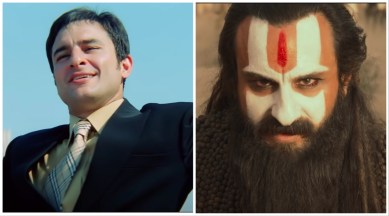Click here to follow Screen Digital on YouTube and stay updated with the latest from the world of cinema.

A viral Instagram reel recently captured the attention of fans, showcasing a content creator joyfully dancing through foreign streets dressed in a button-down shirt, a pair of jeans and a leather crossbody bag while the 2003 film Kal Ho Naa Ho’s hit track ‘Kuch To Hua Hai’ plays in the background. The comments section overflowed with nostalgia with many reminiscing about the ‘old Saif Ali Khan’ and how his ‘chocolate boy era was the best.’ But was it?
After Farhan Akhtar gave a new lease of life to Saif Ali Khan’s career with Dil Chahta Hai in 2001, The actor, who turns 53 today, cemented his position with roles that epitomised his boy-next-door charm. His portrayal of lovestruck-playboy characters in films like Kal Ho Naa Ho (2003), Hum Tum (2004), Parineeta (2005) which, though minted good money at the box office and gave Saif the credibility of being a bankable star, also typecasted him as the quintessential chocolate boy.
While Saif tried and ventured into diverse roles like the one in Sriram Raghavan’s remarkable film Ek Hasina Thi (2004), it did more for his co-star Urmila Matondkar’s career than his own. However, it didn’t take Saif long to break this mould, and his portrayal of the ultimate antagonist — a loyalist turned bitter gangster — Ishwar ‘Langda’ Tyagi in Omkara (2006) marked a pivotal shift. His rugged look in the film reshaped his audiences’ perception of his versatility as an actor.
It was after the success of Omkara that Saif’s effort to break free from the ‘chocolate boy image’ became prominent. While his experiments didn’t always equate to box office hits, they showcased his dedication to varied characters. He played a terrorist in Kurbaan (2009), a secret agent in Agent Vinod (2012), an aspiring teacher in Aarakshan (2011), a businessman in Race 2 (2013) and even a blonde-haired zombie killer in Go Goa Gone (2013). Talk about range!
Even his romantic roles – Cocktail (2012) and Love Aaj Kal (2009) – exhibited depth and rootedness. Cocktail’s Gautam made me laugh insanely with his antics, while Love Aaj Kal’s Jai and Veer made me believe in the power of love. Honestly, I would choose Jai and Veer over Kal Ho Naa Ho’s Rohit and Salaam Namaste’s Nick any day.
But Saif’s character selection process has become more refined over the years. To quote Uncle Ben’s famous line, ‘With great powers come great responsibility,’ Saif’s approach towards his work has been nothing close to this adage. The actor has built his star power over the year, but he doesn’t take it as a responsibility. In fact, his role as an ash-smeared Naga sadhu in Laal Kaptaan (2019) proves that Saif is having the most fun he has ever had with his characters.
Call it being brave or being secure as an actor, but Saif’s approach towards his characters has been simple – they should be unique and they should let him flex his acting abilities. The actor agreed to portray the role of an antagonist in Ajay Devgn’s Tanhaji (2020) even when he didn’t agree with the politics of the film because to quote the man himself, “it was a delicious role.” Saif doesn’t fear being seen as the bad guy and that shows the enormous self-assurance the actor has. Otherwise, who could have made the 10-head Lankesh, a product of poor VFX effects, palatable in an equally abysmal Adipurush (2023).
Saif’s recent roles include a fake tantrik in Bhoot Police (2021), an ex-conman turned ticket collection in Bunty Aur Babli 2 (2021) and a cop in Vikram Vedha (2022). But the character that resonated the most with Saif’s personality and which brought the Rohits and Nicks of Saif’s universe to come of age was his role of Jazz in Jawaani Jaaneman (2020). Like his previous characters, Jazz was also a quintessential commitment-phobic playboy, but in his 40s. Jazz’s reluctance to grow up aligns with Saif’s own outlook towards his career. He doesn’t want to grow up and crush his desire to experiment with his characters under the pressure of being a star. Saif marches on and continues to make brave choices while being pretty successful at that.
How can we say that? Imagine this, if all the characters that Saif has played in the past few years come together in a room, will they be able to talk? I doubt that. Why? Because they will have nothing in common.
Click here to follow Screen Digital on YouTube and stay updated with the latest from the world of cinema.